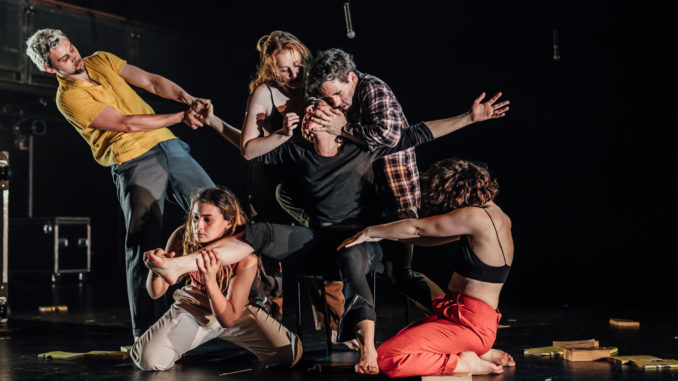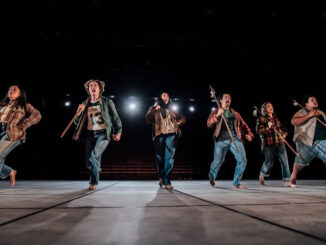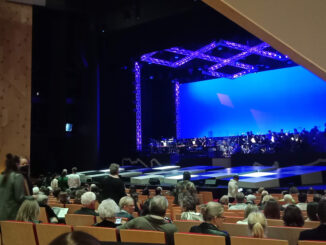
When people ask me what I’m into, I struggle to list anything beyond “theatre.”
I’m a theatre obsessive. A tragic. I decided long ago to make it a core part of my identity, and I’ve stubbornly stuck to that pact ever since.
In those moments when I take a hard look at my relationship with theatre, wondering if it would be desirable to be a little more of a well-rounded person, I realise a big factor in why I return opening night after night, is comfort.
Yes, theatre can challenge you, reassemble your identity over three acts and an interval, expose you to topics and perspectives you might not otherwise have considered. But primarily, it’s the comfort. The comfort of knowing there is a place I can go to, sit (admittedly in often less than comfy chairs), and have the lights come down on an anxious world up and up on the representational. The comfort of being provided a respite, for an hour or so, from a social and economic system designed to remind us of what we lack, to make us use, consume, and discard; instead, I spend my time and money on a different cycle of consumption and release – ephemeral and unrepeatable performance (never quite the same way again). The comfort of having a place where I can escape from myself, whilst also keep coming back to try to understand myself – and the world – a little better each time.
And what makes the comfort especially irresistible, for me, is the special energy in the room that can only truly be generated by live performance. The presence of the actor’s body, breathing the same air as you. The temporary community formed by the audience bearing witness. When you take the collective gasp. When your heartbeats synchronise.
In The Secret Life of Theater, Colombia University’s Brian Kulick describes this theatrical phenomenon as “fellow-feeling.” Theatre “gathers a group of individuals together, sits them down, makes them all face the same direction, and asks them to watch a living representation come into being; having collectively experienced this, it wants to know whether this representation speaks to ourselves and those around us.” Theatre is a plural activity, moving us from I to we.
When I go to theatre, I (mostly) feel less lonely. It is the main place that I socialise. I love to go with friends and talk about what we’ve seen. I go on my own a lot too, but with the knowledge I can usually find a friendly face in the foyer. Theatre is my sports club, my local pub, my church.
All of this is to try to explain the overwhelming existential dread bubbling right now in my gut. This is where I make the subtext of the above paragraphs plain, but perhaps this is an unnecessary gesture. I am provoked to write down why theatre is important to me, because of the fear that it is something that I – that we – might not have for a while.
This is an opinion piece on COVID-19 and its impact on theatre in Aotearoa. I have debated the value of writing this. On the one hand, I feel an obligation: I am a theatre academic and commentator and editor of this website, and this is the defining issue of our sector right now. Of course we need something on Theatre Scenes. But this is also the defining issue of our global economy and social ecology, and the voices we need to be hearing from right now are our health experts. But I choose to write because I believe pulling together and documenting what is happening is important, because I want to offer some suggestions around where people with means might be able to direct some support, and I want to amplify advocacy around how our country can give back to artists who give us so much.
Theatre in the Time of the Coronavirus
The COVID-19 pandemic, and the measures that citizens need to take to flatten the curve and stop the spread, challenges two intertwined principles of performance.
The first, is the grit-your-teeth, smile-when-you-are-low, show-must-go-on mentality – that no matter what adversity befalls your company, your first duty is to get the show on the stage for your audience. It’s a toxic belief, convenient for unscrupulous financial backers to propagate; if continuing with a show could cause mental and physical harm, of course it should be cancelled. But this show business mantra is deeply ingrained, and deciding not to go on with the show can cause considerable psychic distress. All those hours. The financial, artistic, and emotional investment that won’t get to meet its audience.
The second is the innate desire to want to provide that comfort, a place where people can escape from the latest hellfire afflicting the world. To bring people together. To bring joy. To channel anger into activism. To try to do some good in your local sphere.
But bringing people together (publicly, at least) is the opposite of what we as local communities need to be doing right now.
The curtains are down in the world’s theatrical centres. Broadway – which exemplified the show must go on drive by opening their doors again two days after 9/11 – is dark. On the Governor’s orders, all performance venues in New York are shut. In the UK, 300 performance venues are closing their doors as a response to the Governments’s call for drastic action, impacting 290,000 people working in the industry. Theatres are closed in Italy, France, Greece. Venues and productions are closing across Australia, with Live Performance Australia estimating half a billion dollars of lost revenue and thousands of job losses. International tours are grounded. Often an overlooked component of the world economy, this is a catastrophic situation for the global live performance industry.
Aotearoa’s performing arts are currently in a limbo. The Government’s directive for international arrivals to self-isolate for 14 days immediately resulted in the cancellation of touring works planned for the likes of the Auckland Arts Festival and the New Zealand Fringe Festival. The policy announced on Monday advising against gatherings of 500+ people meant The Book of Mormon musical, playing at Auckland’s Civic Theatre, joined its Broadway counterpart in dismantling ts doorbell.
Other 500+ seat venues are attempting to continue trading with reduced capacity. The ASB Waterfront Theatre, home of the Auckland Theatre Company, are limiting ticket sales to a total of 500 people per performance. The Pop-up Globe, ignoring historical precedent, is seeing out its final week with a similar reduction in capacity (due to plague, theatres in Shakespeare’s day were closed more often than they were open during the first decade of James I’s reign).
But continuing with performances of fewer than 500 people (and let’s face it, our industry scale means most shows play to well below 500 per night) is difficult to reconcile with the Prime Minister’s promotion of social distancing (i.e. keeping a distance of at least two metres between people). [UPDATE 19/30: The Government has extended its policy on cancelling mass gatherings to apply to indoor groups of 100 and above. This resulted in the Pop-up Globe cancelling their final performances and the majority of the Auckland Arts Festival events ending]
Cancellations are coming thick and fast. The New Zealand Festival of the Arts cancelled its final day of performances. The Auckland Arts Festival limps to its finish line, with a number of cancellations (and livestreamed concerts). Red Leap Theatre Company cancelled the remainder of its North Island tour of Owls Do Cry. Tuatara Collective cancelled performances of Little Black Bitch in Whangarei. Christchurch’s Court Theatre are continuing with Lysander’s Aunty but cancelled four upcoming shows [UPDATE 22/03: Lysander Aunty’s by Trick of the Light will not go ahead]. The Dunedin Fringe Festival is no longer going ahead. Tauranga’s Baycourt Theatre is closing its doors for the rest of the month. Wellington’s Red Scare is postponing the upcoming BATS season of White Men. Both Year of the Tiger and Essays In Love have closed early this week at Basement Theatre. Amici Trust’s production of Mary Poppins has been postponed indefinitely. FAFSWAG are unable to go ahead with their European tour. [UPDATE as of 22/03: Almost no live theatre events throughout Aotearoa will be going ahead over the next weeks. Venues like Circa, Basement, BATS, Centrepoint have closed their doors for now.]
Whilst cancellations are mounting at NZ Fringe, the festival is currently seeing through its final week [UPDATE 22/03: The NZ Fringe closed on Saturday 21 March with just three live shows still performing]. Seeing shows this week has felt like a grim task, and audience numbers are visibly down. I have made the personal call to keep going, to support the mahi of the independent artists, to provide another body for them to play to. Other Theatre Scenes reviewers writing in Auckland have made the call to keep away from Arts Festival shows this week – I do not feel right in asking them to attend the theatre for the next while.
It has been good to see NZ Fringe venues institute measures such as recording contact details and encouraging audiences to space themselves around the seating blocks. Whilst the current Ministry of Health advice is that such performances can continue, these smaller venues and their artists are in a financial, contractual, and ethical bind: should the show go on?
The New Zealand International Comedy Festival has made the not at all funny but very sensible call to cancel their 2020 dates. That’s a huge black hole for key Auckland and Wellington venues over three weeks in April/May. It is inconceivable that these venues (Q Theatre, The Basement, BATS etc) would be able to programme any other events.
Practitioners across the country are having to make painful decisions which are impacting thousands of arts workers.
The potential losses that a company might face in putting on a show in the coming months if an audience does not show up (and with the dominant message right now promoting social distancing, nor should they) might be greater than the loss incurred in not putting a show on at all.
But of even greater importance are the ethical dimensions. In making the decision to end its tour, Red Leap theatre explained that “it is in the best interest of public health that we do not promote opportunities for gatherings of people – it is this consideration that has led us to this difficult decision.”
Professor Michael Baker of Otago University Department of Public Health is advocating for the country to take a full suppression approach to the pandemic over the next month – to stay home while the country ramps up its testing capability.
Artists and audiences need to make the decision that is right for them, but an abundance of caution seems prudent.
Artists are leaders in our society – prodding, challenging, showing us the way. Not going ahead with a show, not being able to communicate with a live audience goes against every fibre of a theatre makers’ being, but there is a strong moral argument that social leadership is not putting a live show on at this time. [UPDATE as of 22/03: With the Government announcing New Zealand is at a level two alert for our Covid-19 response, and the need to reduce contact, it is even more important that live theatre sits this one our for now.]
Resilience, Rescue and Recovery
The tension is the livelihoods at stake. The performers are the public face of production cancellation, but you only need to look over a show programme to appreciate the teams of people behind the scenes that are affected by the shuttering of productions: directors, designers, technicians, producers, production managers, stage managers, publicists, ushers, hospitality staff, venue staff, on and on. Our local live arts industry is under incredible and heartbreaking strain.
Creative New Zealand and New Zealand on Air’s 2019 profile of Creative Professionals details the significant challenges of making a living as a creative professional in Aotearoa. This group of workers already begin on a low income base, with a median personal income of $35,800, compared to $51,800 for all New Zealanders earning a wage or salary. 37% of Creative Professionals reported finding it difficult or very difficult getting by on their existing income. Alarmingly, 23% report that they do not have a safety net to support them during fluctuations of income.
There is mobilisation. On Facebook, the group AA(e)-C(19)C – Aotearoa Arts and Events during the COVID-19 Crisis has been formed as an essential platform for knowledge sharing and action. Performing Arts Network NZ (PANNZ) announced it would become a portal for information for the industry. Creative Kōrero has been formed to support artists to up skill: “Rather than shutting ourselves away completely, let’s use this time to build excellent relationships and develop some rad skills for the future!”
The Government’s economy rescue package includes provision to support freelance contractors who are losing work. (Leonie Hayden has advice about accessing it). But as Mark Amery asks on The Big Idea, “where is the emergency arts industry package?”
Creative New Zealand has signaled it will produce a plan on 31 March for how it will support the art sector through this crisis. “Our senior leadership team is assessing the evolving situation […] and discussing how we might be able to further support the sector. No stone will be left unturned. This will be our first priority.” Let us hope that what CNZ loses in nimbleness, it gains in thoroughness with its awaited plan.
CNZ’s response to the COVID-19 pandemic will be the greatest test the organisation has faced in the 25 years since its formation (its regional response following the Christchurch Earthquakes provides some models). For a body that has historically been perceived as not going out of its way to save companies in financial trouble, its end of the month plan, and the extent of the financial backing it can muster, is going to be decisive.
CNZ recently adopted the strategic goal that “New Zealand’s arts sector is resilient.” Now is the time to back this to the hilt. The entire theatre and arts ecology is at risk – from the larger funded companies to the independent theatre makers.
As as a fundamental bottom line I would like to see a goal from CNZ that no arts company/ organisation should be left to fold as a result of the COVID-19 pandemic.
As a country we need to back our arts makers through this challenging period. Keep the wages paid. Invest in research and development. Encourage CNZ clients to support the independents. Fund our sector to wait out the pandemic – no matter how long this takes. [UPDATE as of 22/03: CNZ has announced an initial $4.5 million emergency response package for the arts sector, consisting of emergency support for the existing clients it recurrently funds, as well as rolling grants for independent company’s and freelancers.]
We can play our part too as citizens.
One action promoted on social media has been to refuse refunds for cancelled performances and donate these back to the productions.
If you have the means, I encourage you to consider where you might be able to donate financially to the arts. Is there an artist or group who have provided you with comfort, joy, inspiration who would appreciate some financial assistance over this period?
In particular, I invite you to join me in supporting two established avenues:
- The New Zealand Actors Benevolent Fund is a not-for profit charity that provides “assistance to professional performers, both young and old, who, due to injury, illness or disability are unable to work, either temporarily or in some cases for the rest of their lives.” Running since 2013, this is a well established fund, offering a safety net that performers may otherwise be unable to access.
- Auckland’s Basement Theatre is currently fundraising to Make Basement Better. Hoping to raise $200,000, this is a goal that absolutely should not be borne by its artistic community, especially now. As a pillar of New Zealand’s independent theatre scene, an investment in The Basement ripples throughout the community.
UPDATES:
- Dunedin Fringe is fundraising on Boosted for the 750 creatives affected by the Festival’s cancellation. Money raised goes directly to artists.
Uncertain Horizons
It is foolish to make forecasts for what the next few months and longer might bring. There is hopeful talk of being able to use any isolation to seed new creative works and responses – but this won’t be possible if you are stressed about your whānau, health and financial position. Live streaming and digital art are also being offered as alternatives, and whilst these are powerful tools in their own right, allowing us to connect across space and geography, they may very well highlight why they can never replace the energy of sharing a story in a room together.
As Brian Kulick writes, “Human beings were not built to be alone and although each of us is resolutely singular, life only seems to make sense when it is connected and directed towards others. Theatre reminds us of this simple fact.” Kulick thinks that we take “strange and complex phenomenon” of being an audience in theatre for granted, “incurious as to what might be happening to our consciousness as we move from the real world to the world of theatrical illusion.” Perhaps through the period of social distancing the world will be reminded of the power of this, and become curious again. Is being able to gather for live performance something we value? A human need that we need to recognise beyond capitalist metrics?
When we do reach the time when there is widespread access to a vaccine, and pandemic measures are eased, and we go back to ‘normal’, we cannot return to how it was.
We know that our artists were already under financial and mental stress; that theatre practitioners, according to CNZ and NZ on Air’s research, are “more likely than average to think there are not sufficient opportunities for them to sustain their creative career in New Zealand.”
We require a fundamental re-weaving of our social safety net, tattered and torn by the gig economy and chronic under-investment in our people. This includes the place of artists within this net and the resources that are available to support their work in-between projects. It is also about championing accessibility in the arts so even more people can participate.
It is about valuing the arts as a social good. A health good.
Surviving the COVID-19 crisis is not enough. We must aim for thriving.
FURTHER READING
- Sam Brooks for The Spinoff: Covid-19 is pushing New Zealand’s performing artists to the brink
- Mark Amery for The Big Idea: Where is the Emergency Arts Industry Package?
- Tim Batt for Metro Magazine: Why the 2020 NZ Comedy Festival Cancellation is so Heartbreaking
- Vanessa Crofskey with Alice Canton for The Pantograph Punch: Making Art with Strangers
- Playwright and legend Renée for Newsroom: Renée, 90, wishes to self-isolate
- Kate Prior and Lana Lopesi hear from freelance artists for The Pantograph Punch: Freelance Freefall: Covid-19 and Our Artists
See the Ministry of Health website for latest COVID-19 guidance.




Leave a Reply